
A Sporting Time in England
Author:
Lutz Pietschker
Version: 1998
Games
|
Home Page
|
Links
|
What's New
Lambourne Games Day '98
This is the translation of an article I wrote for the
Berliner Spiele-Anzeiger, a Berlin games magazine run by Martina Hellmich. Published with friendly permission of BSA.
Includes short descriptions of the games "Devil Take The Hindmost", "Hillclimb", "Metric Mile", "Speedway Challenge" and "Sport of Kings".
Lambourne, Suffolk
Don't look it up in your atlas- there is no such place. Lambourne Games, the 2-person-enterprise of Terry and June Goodchild, took its name from their Ipswich address at the time they ran the games shop "War and Peace", some years ago. But "Lord Lambourne" is a hallmark in the English gamer's scene. He always liked to play games and also participated in many sports. Today, in the age of 61, he still is an active cricket umpire and always keeps an eye on current sports events.
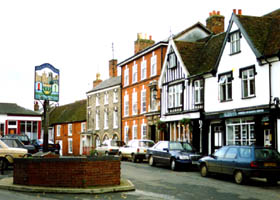 It was a long way to become a successful author and publisher of games and there have been clashes with his other occupations. Nine years ago Terry left his job as an insurance claims manager and opened a games shop in the hope to get some more time to write. He had in mind an unconventional novel about WW I aerial combat. Though he did not succeed to publish the book one lasting result was his
well-acclaimed
game "Wings over France". The Ipswich shop is no more. Terry concentrated on developing sports replay games and today lives in Woodbridge, Suffolk. The place is otherwise known for its tide mill, Buttrums Windmill (which is used in the Lambourne logo) and for the ancient Saxon burial place, Sutton Hoo.
It was a long way to become a successful author and publisher of games and there have been clashes with his other occupations. Nine years ago Terry left his job as an insurance claims manager and opened a games shop in the hope to get some more time to write. He had in mind an unconventional novel about WW I aerial combat. Though he did not succeed to publish the book one lasting result was his
well-acclaimed
game "Wings over France". The Ipswich shop is no more. Terry concentrated on developing sports replay games and today lives in Woodbridge, Suffolk. The place is otherwise known for its tide mill, Buttrums Windmill (which is used in the Lambourne logo) and for the ancient Saxon burial place, Sutton Hoo.
I knew that much when I embarked the Hamburg-Harwich ferry on October 22nd. I spent the lively transfer reading games rules, anxiously watching green-tinged children and jotting down notes about a new game that would feature seagulls. 21 hours later I was released to left-hand driving. My first stop was "Strange Games" in Framlingham, a shop that had been recommended to me. But then I proceeded directly to meet some participants of Games Day in the "Bull" hotel, right in the middle of "Woodbridge City", for a pre-event chat.
Group of Experts
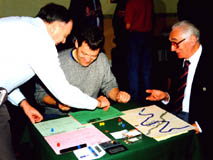 Everyone who has taken part in a gaming convention knows that good feeling to be in a group of like-minded people. This feeling is more intensive as the common area of interest gets more exotic. Well, from a German point of view, sports replay games are rather exotic- and I felt rather fine. Only six players had made it that evening to exchange some gossip and discuss games details, but since most of them had not seen each other for a long time there was a lot to tell. I was rather relieved to find that my English was adequate. Of course it was an effort to follow such a lively exchange, and fell into bed quite tired that evening- maybe the pints of cider had something to do with that, too.
Everyone who has taken part in a gaming convention knows that good feeling to be in a group of like-minded people. This feeling is more intensive as the common area of interest gets more exotic. Well, from a German point of view, sports replay games are rather exotic- and I felt rather fine. Only six players had made it that evening to exchange some gossip and discuss games details, but since most of them had not seen each other for a long time there was a lot to tell. I was rather relieved to find that my English was adequate. Of course it was an effort to follow such a lively exchange, and fell into bed quite tired that evening- maybe the pints of cider had something to do with that, too.
The Great Day
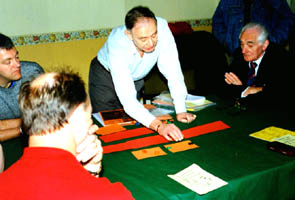 Saturday brought "English" weather- torrential rain. From about 9 a.m. on the 21 participants began to drop in, and Terry explained the planned course of events. Six sports competitions were open for play, and there was a presentation of new games, too. The schedule was set up to allow everyone to participate in all games. The big events, assembling nearly the complete group, were the "Metric Mile" contest, the "Ryder Golf Cup", the presentation of new games and the closing event and highlight, the "Sport of Kings" horse race. The solitaire "Hillclimb" car sprint racing could be wedged into slack time individually.
Saturday brought "English" weather- torrential rain. From about 9 a.m. on the 21 participants began to drop in, and Terry explained the planned course of events. Six sports competitions were open for play, and there was a presentation of new games, too. The schedule was set up to allow everyone to participate in all games. The big events, assembling nearly the complete group, were the "Metric Mile" contest, the "Ryder Golf Cup", the presentation of new games and the closing event and highlight, the "Sport of Kings" horse race. The solitaire "Hillclimb" car sprint racing could be wedged into slack time individually.
Jeff Packe had prepared custom runner cards for the "Metric Mile". Hand-painted athletes and Jeff's reporter-style commentary gave a singular atmosphere to the race. The "Hillclimb" was run on the new "Lambourne Hill" venue so all players had to cope with an unknown circuit. For the golf cup, players were divided into two teams, "Europe" and "USA". Each player represented one golfer that went along the course pitted against his direct opponent. There was a lot of suspense and a surprising draw result in the end. I did not play the "Speedway Scene" and the "Ski World Cup" because at that time I was engaged to represent the Germans in a demo mission of "Wings over France", and a real nasty German I was, as it happened.
Only 12 players turned up for the final horse race event because some had to leave early because of weather troubles. Each participant got 4 horses and had to try and run them to maximum efficiency in four races, cashing in on prize money and bets. As it happens often, victory or defeat were decided upon only in the last race.
Group and Family Games
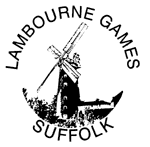 In the previous
article for the BSA
I did tell you about pure sports replay games. What I want to present now are games with more of a tactical challenge and suited for group or family play. To be true, the games still are outstanding simulations in the sense of showing the actual deciding factors and giving the feel of the real event, but they are not meant to re-produce exact statistics for a season or a specific event. The material of the games is typical for Lambourne, i.e. rather plain. The effort was clearly put into the basic design rather than production.
In the previous
article for the BSA
I did tell you about pure sports replay games. What I want to present now are games with more of a tactical challenge and suited for group or family play. To be true, the games still are outstanding simulations in the sense of showing the actual deciding factors and giving the feel of the real event, but they are not meant to re-produce exact statistics for a season or a specific event. The material of the games is typical for Lambourne, i.e. rather plain. The effort was clearly put into the basic design rather than production.
Devil Take The Hindmost (2-6 players)
 A fast, nasty indoor bicycle race; the game will soon be produced under license by the English publisher
Fiendish Games
and by Franjos of Germany. Each player runs 2 to 4 cyclists, depending on the total number of players. The are moved along the 30-space oval by playing cards of a canasta set. Every few laps, as the title suggests, the hindmost cyclist is taken out of the race and the others are re-arranged in order of field position. Naturally, the game ends when only one rider is left.
A fast, nasty indoor bicycle race; the game will soon be produced under license by the English publisher
Fiendish Games
and by Franjos of Germany. Each player runs 2 to 4 cyclists, depending on the total number of players. The are moved along the 30-space oval by playing cards of a canasta set. Every few laps, as the title suggests, the hindmost cyclist is taken out of the race and the others are re-arranged in order of field position. Naturally, the game ends when only one rider is left.
The crucial point for card play is that most cards have a double capacity, depending on the number of the space the cyclist occupies. For example, an "8" normally moves him 3 spaces, but it is 8 spaces if he currently is on space no. 8. The challenge is to play cards to the best advantage and never lose sight of the next timing point- the devil catches up faster than you think.
Hillclimb (1 or more players)
 A fast solitaire game that also is fun with a group, the non-active players taking times and acting as the enthusiastic crowd. "Hillclimb" is a kind of car race that is more popular in Britain and the USA than in Germany. Each cars runs "against the clock" individually on a curvy circuit usually 1 to 4 miles long. In the game, the circuit is represented by 10 track sections that allow a maximum safe speed. Players have the choice between eight different car types.
A fast solitaire game that also is fun with a group, the non-active players taking times and acting as the enthusiastic crowd. "Hillclimb" is a kind of car race that is more popular in Britain and the USA than in Germany. Each cars runs "against the clock" individually on a curvy circuit usually 1 to 4 miles long. In the game, the circuit is represented by 10 track sections that allow a maximum safe speed. Players have the choice between eight different car types.
For each section you may switch gears, brake or accelerate (change revs). Not every action will work out as planned, so what really happens is determined by a roll of 2 dice. Rough driving is risky and may damage or even eliminate the car. The resulting combination of gear and revs determines the actual speed, taken from a car-specific table. The results of excessive speed are taken from another table and they may end your run prematurely.
Of course, the trick is to drive each section as close as possible to the safe speed, without damaging your car. From the section speed values a time total is calculated which is the final result to determine the winner. Certainly there is a chance factor, but since each driver has a few tries and only the best result counts on average the most skilful driver is most likely to win.
Metric Mile (3 or more players)
 What a nice way to say "1500 metres"! Because that's what it is, with less detail than "3 3/4 Laps" but more dynamic and better suited for group play. Nevertheless we have a real simulation here for which Terry and others have compiled characteristics and results of real-world athletes, made them compatible and distilled them into tables.
What a nice way to say "1500 metres"! Because that's what it is, with less detail than "3 3/4 Laps" but more dynamic and better suited for group play. Nevertheless we have a real simulation here for which Terry and others have compiled characteristics and results of real-world athletes, made them compatible and distilled them into tables.
For each runner there is a card with such tables, one for each mode of running, that determine progress depending on the roll of two dice. Also noted on the cards are stamina and penalty factors that apply if this athlete leads or loses contact. Other tables are needed only if runners are boxed in or if you want to calculate a time result after the race. You run the race on an abstracted track display but it looks better if you use the "3 3/4 Laps" track oval.
Each player runs one or more athletes. There are 10 turns to a race, with the 1st representing the first lap, the 2nd and 3rd the second lap, the 4th to 6th the third lap and the remaining 4 being reserved for the sprint. Thus, suspense is building steadily towards the finish. On each turn the leading runner is the first to move. You announce the running mode, i.e. normal, pick-up, forcing, or sprint. Then two dice are rolled, the progress is read from the appropriate table on the runner's card, modified for leading or lost contact, and the pawn is moved accordingly. Now the loss of stamina is noted: The lower of the dice for normal mode, the value of the green die when picking up, the higher die when forcing it, and the sum of both in sprint. Once you have switched to sprint mode you must continue to sprint. A runner that is out of stamina points moves in "ease back" mode: At no cost, but erratic and slow. Runners boxed in by others risk a stamina penalty or even injuries; you may sacrifice part of the move to avoid such a situation.
"Metric Mile" is a fast, fluid game system that excellently combines realism, fun, tactics and a chance factor.
Speedway Challenge (2-4 players)
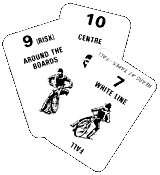 This is a fast, exciting card game using a special set of cards. A race is run over 4 laps, one card being played for each lap plus one for the start. Each player runs one or two drivers with his hand of 5 cards. The hand is replenished immediately after play of a card, drawn at the player's choice from an open selection or from the face-down stack. Start cards are played simultaneously face-down and then revealed, after that the leading driver always goes first.
This is a fast, exciting card game using a special set of cards. A race is run over 4 laps, one card being played for each lap plus one for the start. Each player runs one or two drivers with his hand of 5 cards. The hand is replenished immediately after play of a card, drawn at the player's choice from an open selection or from the face-down stack. Start cards are played simultaneously face-down and then revealed, after that the leading driver always goes first.
Card values range from 4 to 10. The numbers played determine the sequence of drivers after that lap, and the winner after the final lap. However, there are 4 drivers, but only 3 lanes, and each card is assigned one lane. The problem is that you cannot overtake in an occupied lane. High values sometimes have a risk factor, you may fall or your engine may quit. The thing to do is: Watch what cards the others collect and play, build a good hand, and try to avoid going last- often you will find all lanes are blocked by then.
The Sport of Kings (3 or more players)
 This is the crown of the family games and the traditional final event of Lambourne Games Day. It is a gallopping race with fictitious horses. There are, however, extension sets available featuring real-world horses that turn the "Sport of Kongs" into a true replay game. The objective is to run your horses in a series of races and come out first in the total of unused start capital, winnings of bets, and prize money.
This is the crown of the family games and the traditional final event of Lambourne Games Day. It is a gallopping race with fictitious horses. There are, however, extension sets available featuring real-world horses that turn the "Sport of Kongs" into a true replay game. The objective is to run your horses in a series of races and come out first in the total of unused start capital, winnings of bets, and prize money.
The game mechanics are similar to "Metric Mile" insofar as there are tables for each horse to derive a movement factor by the roll of dice, but there are only two modes of going: "normal" and "under pressure". Once you use the whip on a horse it remains under pressure for the rest of the race, and the decision if and when to do this is an important tactical element of the game. There are no stamina points, but some horses become slower after a couple of turns- don't run those in a long race! Other decisions to make are the appointment of jockeys (quality has a price) and the use of the "Superbly Fit" card that gives
one horse
an advantage in
one turn
of
one race.
All horses have a history that influences betting quotas and a handicap value that is used in certain races. Other properties of a horse are endurance, leader quality and preferred turf condition, so there are a lot of factors to balance that (should) influence your decision in which race to enter a horse and how to run it.
The game is best played as a complete season of 13 or even 26 racing weeks, with 6 races run per week. With about 30-40 minutes to one race one weeks' racing can be easily played in a couple of sittings. As each race is of different length and importance, and horses come with very distinct "personalities", long-term planning is the key to success in a campaign.
Come Sun, Come Rain
How I came off on Games Day? Well, I was expressly invited for next year's event, "to take revenge on me". Maybe it did not do particularly much for the European idea that a German won the royal horse race with a horse called "Emperor of France"...
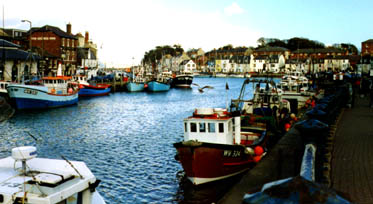 I still had a lot on my schedule, and England smiled on me. While in Germany, Wales and parts of England rivers flooded the land I proceeded under more "clear" than "overcast" towards Salisbury. A break at Stonehenge, of course, and then on to
Weymouth, stage of the game "Plague!". I just wanted to see the town and spent a very good evening in the "Timewalk" exhibition that guides you through the history of the town, and in the old town of Melcombe Regis where the street layout today is still very much the same as in the 16th century.
I still had a lot on my schedule, and England smiled on me. While in Germany, Wales and parts of England rivers flooded the land I proceeded under more "clear" than "overcast" towards Salisbury. A break at Stonehenge, of course, and then on to
Weymouth, stage of the game "Plague!". I just wanted to see the town and spent a very good evening in the "Timewalk" exhibition that guides you through the history of the town, and in the old town of Melcombe Regis where the street layout today is still very much the same as in the 16th century.
In the next days I concentrated on military history: Tank Museum, Bovington (assorted "hardware"); Airborne Forces Museum, Aldershot (briefing models of "Pegasus Bridge"); Imperial War Museum, London (library, photographic archive and a briefing model for the
raid on St. Nazaire); National Army Museum (reading room); Museum of London (metropolitan history). There was still time for one or the other stroll in the city which led me, of course, by the games shops
Leisure Games, Orc's Nest and Playin' Games. However, the current exchange rate of the Pound Sterling is no incentive for liberal buys.
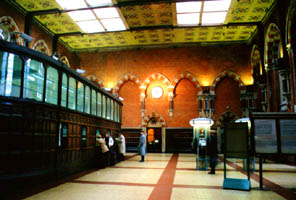 On Wednesday I made sure to drop in at the Small Furry Swiggers gaming club. This was my chance to get a first glimpse of the new games presented at the Essen games fair and to make myself popular by helping out with one or the other rule translation. I think I met some celebrities of the British gaming scene there without identifying them; in any case it was my chance and pleasure to meet
John Harrington
face-to-face who had been, so far, just another e-mail "address" to me. We met again later where he persuaded me that some games ideas of mine were not really ripe for publishing.
On Wednesday I made sure to drop in at the Small Furry Swiggers gaming club. This was my chance to get a first glimpse of the new games presented at the Essen games fair and to make myself popular by helping out with one or the other rule translation. I think I met some celebrities of the British gaming scene there without identifying them; in any case it was my chance and pleasure to meet
John Harrington
face-to-face who had been, so far, just another e-mail "address" to me. We met again later where he persuaded me that some games ideas of mine were not really ripe for publishing.
On Saturday the good times were past and I drove to Harwich, games in my car booth and a lot of pleasant images in my mind. Quite on time the weather turned nasty again, but the torrential rain did not matter any more. I felt very much like I felt after a visit to "Essen": Tired, broke, happy.
Written by
Lutz Pietschker
A related article ("Nachspielzeit") about replay games in general is available in the Internet. A more complete report about Games Day is in Replay Report #52, published by Lambourne Games.
Source and catalogue:
Lambourne Games
15 Mill View Close
Woodbridge, Suffolk IP12 4HR, England
Tel. 0044-1394-388102
or see the
Sports Game Shop
About 28 board and card games of Lambourne's are currently in print, plus several computer games (DOS/Windows).
As the author of this page I take no expressed or implied responsibility for the content of external links; opinions expressed on such pages are not necessarily mine. The web space provider is not responsible for the contents of this page or any linked pages.


Written and published by Lutz Pietschker. Please send comments about technical problems to the
site master.
-Made with a Mac!-
, last change
2011-03-12
 It was a long way to become a successful author and publisher of games and there have been clashes with his other occupations. Nine years ago Terry left his job as an insurance claims manager and opened a games shop in the hope to get some more time to write. He had in mind an unconventional novel about WW I aerial combat. Though he did not succeed to publish the book one lasting result was his
well-acclaimed
game "Wings over France". The Ipswich shop is no more. Terry concentrated on developing sports replay games and today lives in Woodbridge, Suffolk. The place is otherwise known for its tide mill, Buttrums Windmill (which is used in the Lambourne logo) and for the ancient Saxon burial place, Sutton Hoo.
It was a long way to become a successful author and publisher of games and there have been clashes with his other occupations. Nine years ago Terry left his job as an insurance claims manager and opened a games shop in the hope to get some more time to write. He had in mind an unconventional novel about WW I aerial combat. Though he did not succeed to publish the book one lasting result was his
well-acclaimed
game "Wings over France". The Ipswich shop is no more. Terry concentrated on developing sports replay games and today lives in Woodbridge, Suffolk. The place is otherwise known for its tide mill, Buttrums Windmill (which is used in the Lambourne logo) and for the ancient Saxon burial place, Sutton Hoo.
 Everyone who has taken part in a gaming convention knows that good feeling to be in a group of like-minded people. This feeling is more intensive as the common area of interest gets more exotic. Well, from a German point of view, sports replay games are rather exotic- and I felt rather fine. Only six players had made it that evening to exchange some gossip and discuss games details, but since most of them had not seen each other for a long time there was a lot to tell. I was rather relieved to find that my English was adequate. Of course it was an effort to follow such a lively exchange, and fell into bed quite tired that evening- maybe the pints of cider had something to do with that, too.
Everyone who has taken part in a gaming convention knows that good feeling to be in a group of like-minded people. This feeling is more intensive as the common area of interest gets more exotic. Well, from a German point of view, sports replay games are rather exotic- and I felt rather fine. Only six players had made it that evening to exchange some gossip and discuss games details, but since most of them had not seen each other for a long time there was a lot to tell. I was rather relieved to find that my English was adequate. Of course it was an effort to follow such a lively exchange, and fell into bed quite tired that evening- maybe the pints of cider had something to do with that, too.
 Saturday brought "English" weather- torrential rain. From about 9 a.m. on the 21 participants began to drop in, and Terry explained the planned course of events. Six sports competitions were open for play, and there was a presentation of new games, too. The schedule was set up to allow everyone to participate in all games. The big events, assembling nearly the complete group, were the "Metric Mile" contest, the "Ryder Golf Cup", the presentation of new games and the closing event and highlight, the "Sport of Kings" horse race. The solitaire "Hillclimb" car sprint racing could be wedged into slack time individually.
Saturday brought "English" weather- torrential rain. From about 9 a.m. on the 21 participants began to drop in, and Terry explained the planned course of events. Six sports competitions were open for play, and there was a presentation of new games, too. The schedule was set up to allow everyone to participate in all games. The big events, assembling nearly the complete group, were the "Metric Mile" contest, the "Ryder Golf Cup", the presentation of new games and the closing event and highlight, the "Sport of Kings" horse race. The solitaire "Hillclimb" car sprint racing could be wedged into slack time individually.
 In the previous
In the previous
 A fast, nasty indoor bicycle race; the game will soon be produced under license by the English publisher
A fast, nasty indoor bicycle race; the game will soon be produced under license by the English publisher
 A fast solitaire game that also is fun with a group, the non-active players taking times and acting as the enthusiastic crowd. "Hillclimb" is a kind of car race that is more popular in Britain and the USA than in Germany. Each cars runs "against the clock" individually on a curvy circuit usually 1 to 4 miles long. In the game, the circuit is represented by 10 track sections that allow a maximum safe speed. Players have the choice between eight different car types.
A fast solitaire game that also is fun with a group, the non-active players taking times and acting as the enthusiastic crowd. "Hillclimb" is a kind of car race that is more popular in Britain and the USA than in Germany. Each cars runs "against the clock" individually on a curvy circuit usually 1 to 4 miles long. In the game, the circuit is represented by 10 track sections that allow a maximum safe speed. Players have the choice between eight different car types.
 What a nice way to say "1500 metres"! Because that's what it is, with less detail than "
What a nice way to say "1500 metres"! Because that's what it is, with less detail than " This is a fast, exciting card game using a special set of cards. A race is run over 4 laps, one card being played for each lap plus one for the start. Each player runs one or two drivers with his hand of 5 cards. The hand is replenished immediately after play of a card, drawn at the player's choice from an open selection or from the face-down stack. Start cards are played simultaneously face-down and then revealed, after that the leading driver always goes first.
This is a fast, exciting card game using a special set of cards. A race is run over 4 laps, one card being played for each lap plus one for the start. Each player runs one or two drivers with his hand of 5 cards. The hand is replenished immediately after play of a card, drawn at the player's choice from an open selection or from the face-down stack. Start cards are played simultaneously face-down and then revealed, after that the leading driver always goes first.
 This is the crown of the family games and the traditional final event of Lambourne Games Day. It is a gallopping race with fictitious horses. There are, however, extension sets available featuring real-world horses that turn the "Sport of Kongs" into a true replay game. The objective is to run your horses in a series of races and come out first in the total of unused start capital, winnings of bets, and prize money.
This is the crown of the family games and the traditional final event of Lambourne Games Day. It is a gallopping race with fictitious horses. There are, however, extension sets available featuring real-world horses that turn the "Sport of Kongs" into a true replay game. The objective is to run your horses in a series of races and come out first in the total of unused start capital, winnings of bets, and prize money.
 I still had a lot on my schedule, and England smiled on me. While in Germany, Wales and parts of England rivers flooded the land I proceeded under more "clear" than "overcast" towards Salisbury. A break at Stonehenge, of course, and then on to
I still had a lot on my schedule, and England smiled on me. While in Germany, Wales and parts of England rivers flooded the land I proceeded under more "clear" than "overcast" towards Salisbury. A break at Stonehenge, of course, and then on to
 On Wednesday I made sure to drop in at the Small Furry Swiggers gaming club. This was my chance to get a first glimpse of the new games presented at the Essen games fair and to make myself popular by helping out with one or the other rule translation. I think I met some celebrities of the British gaming scene there without identifying them; in any case it was my chance and pleasure to meet
On Wednesday I made sure to drop in at the Small Furry Swiggers gaming club. This was my chance to get a first glimpse of the new games presented at the Essen games fair and to make myself popular by helping out with one or the other rule translation. I think I met some celebrities of the British gaming scene there without identifying them; in any case it was my chance and pleasure to meet